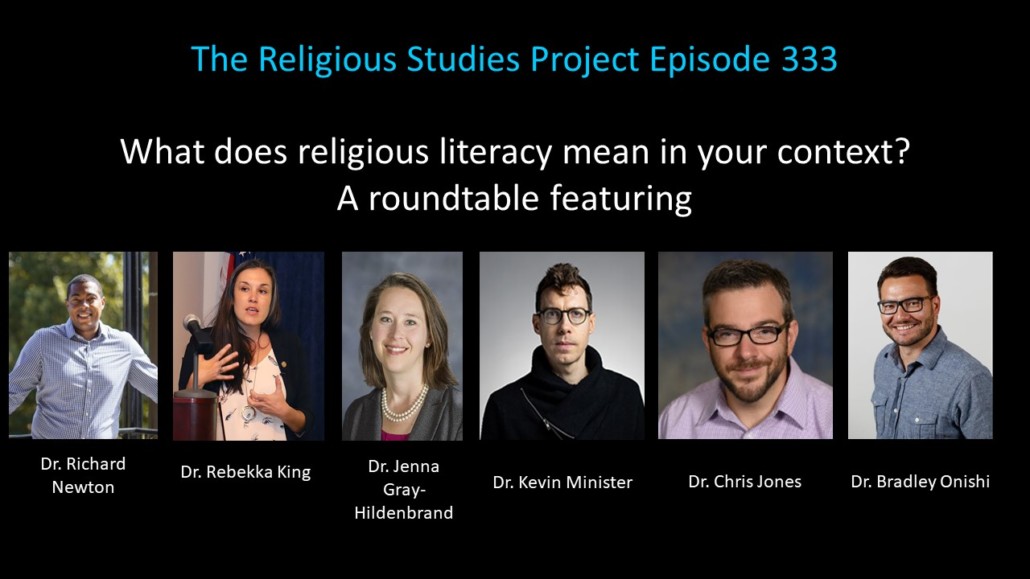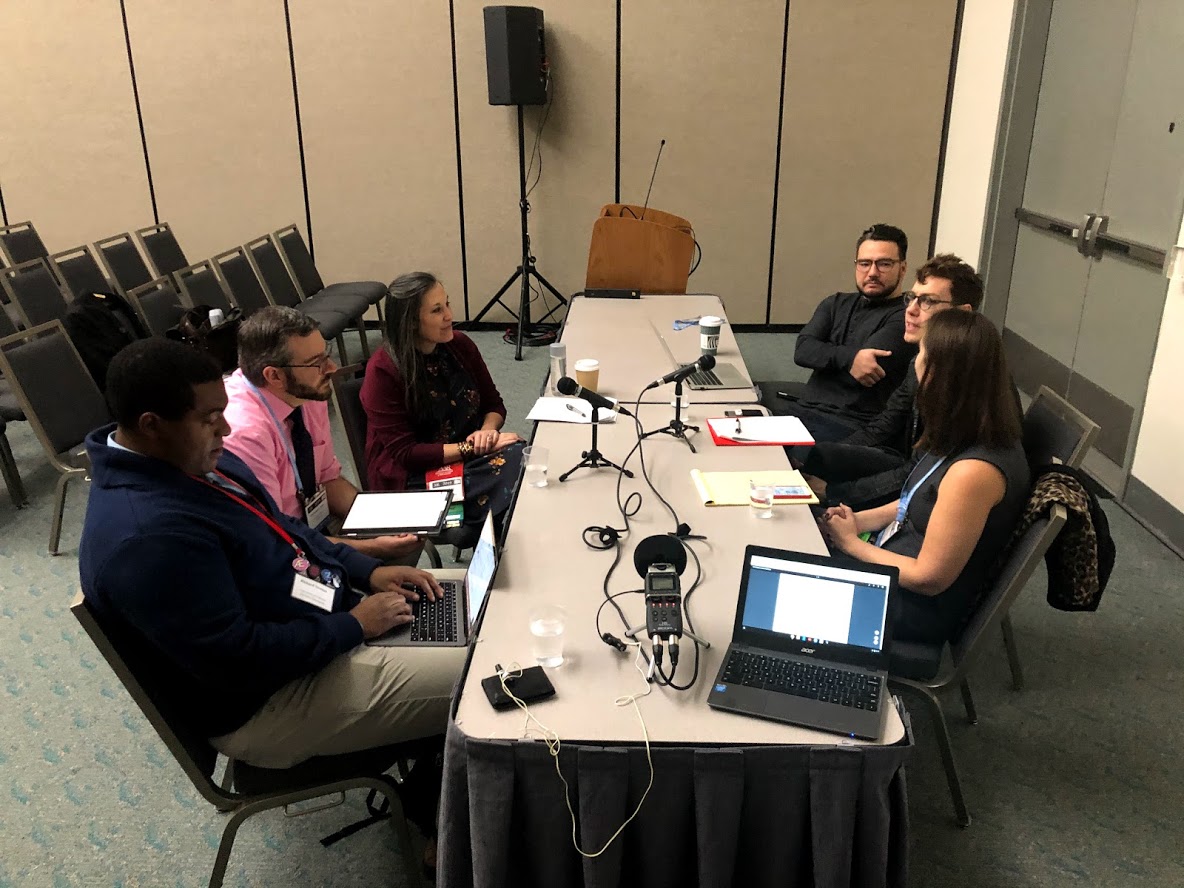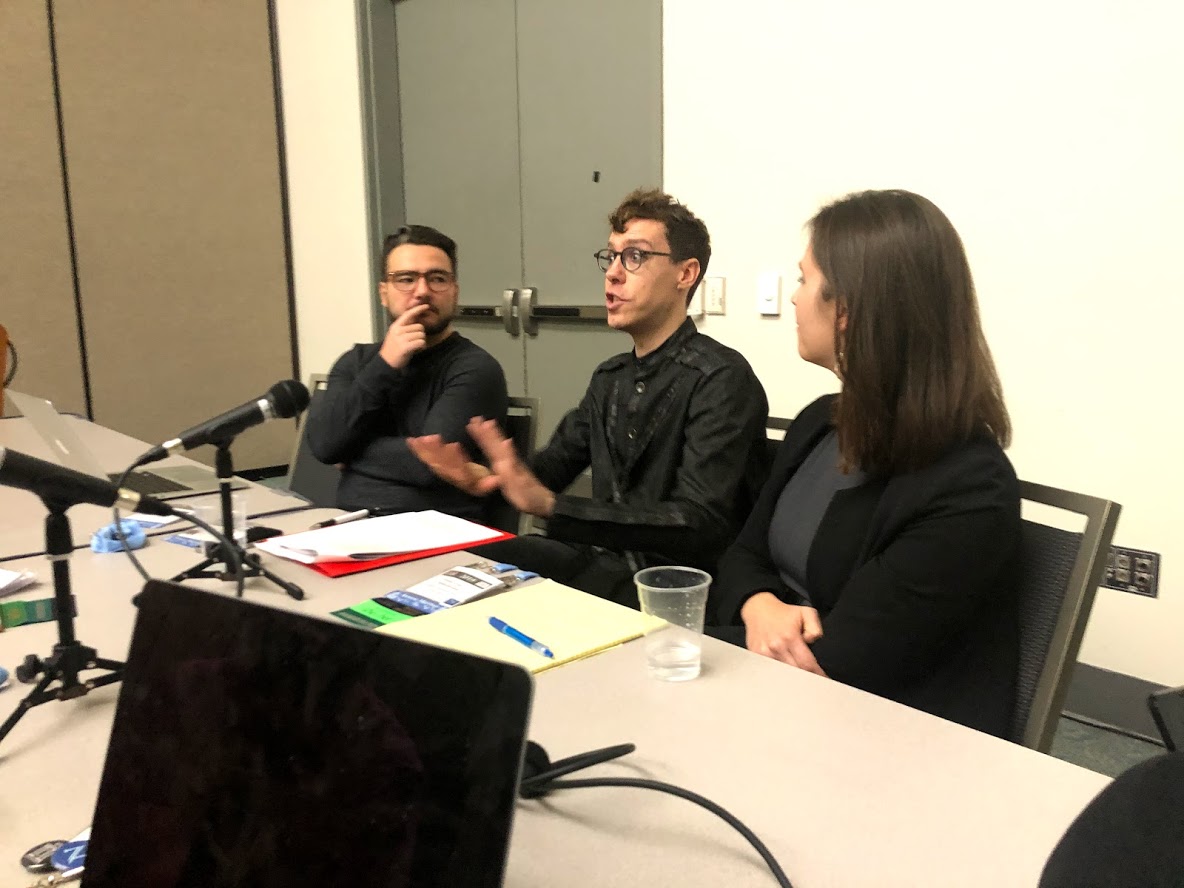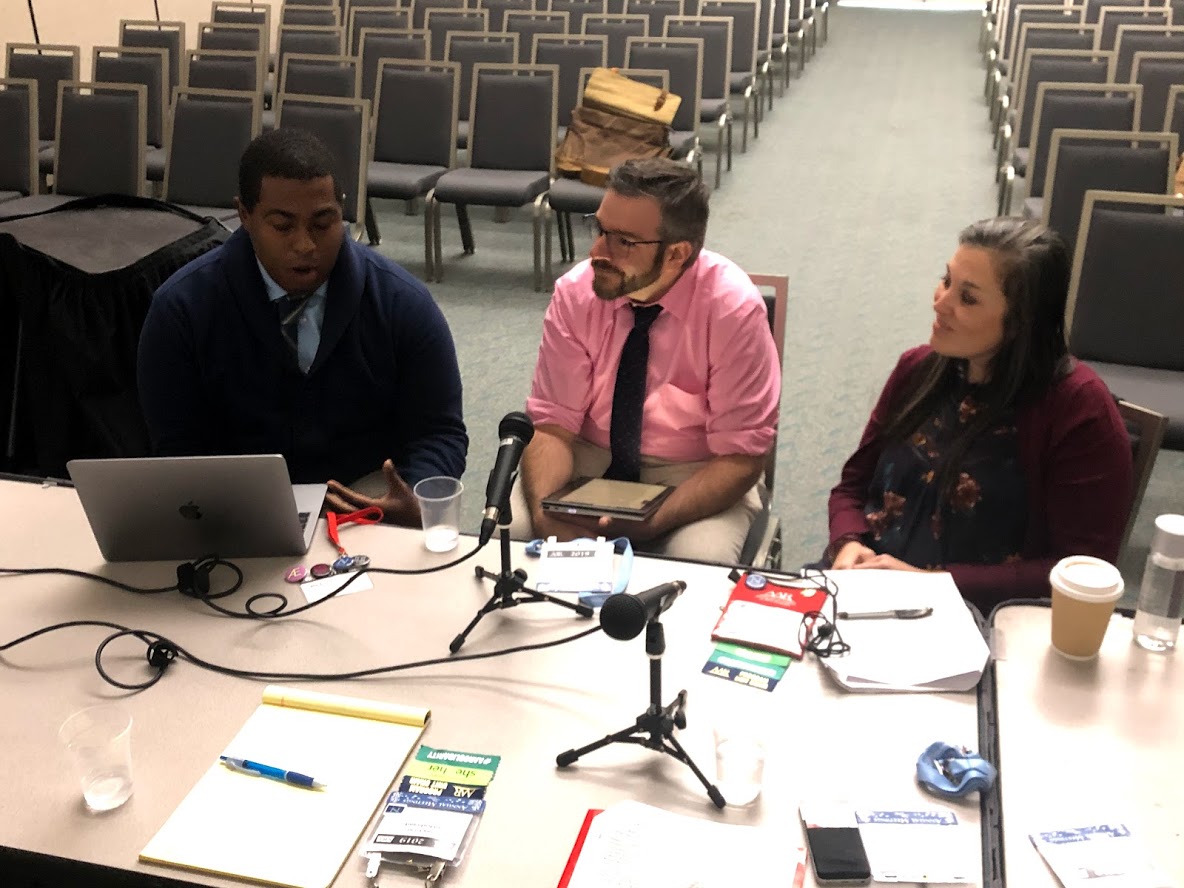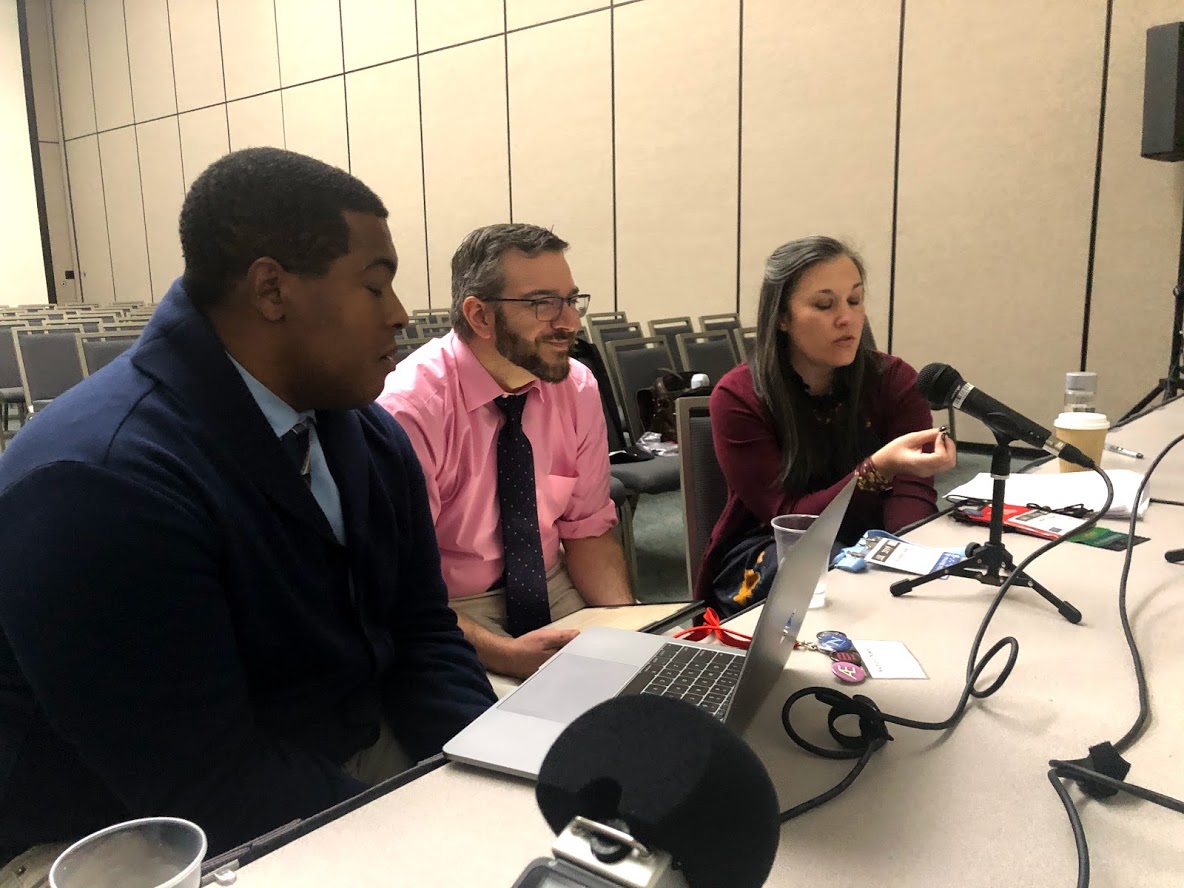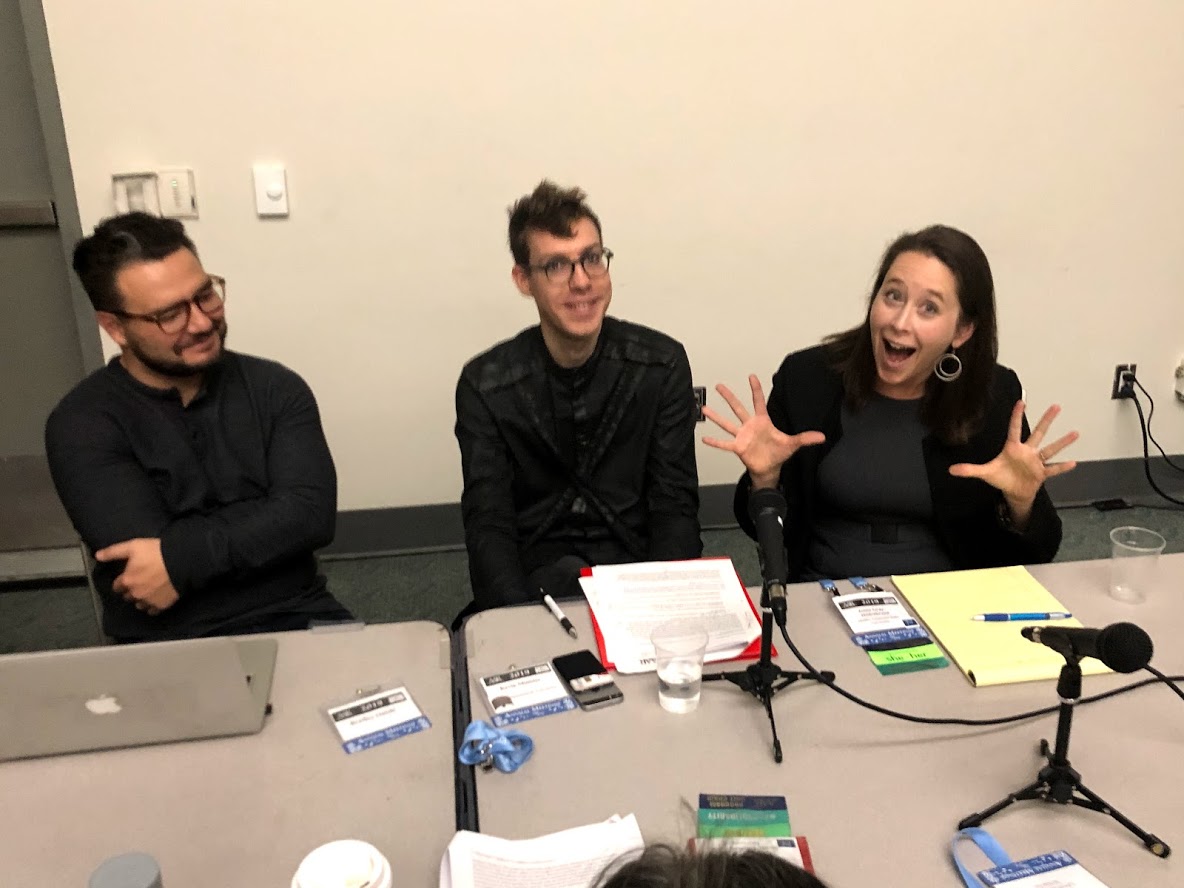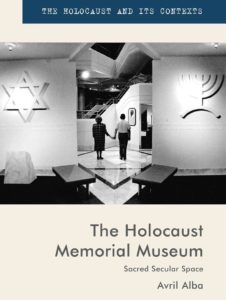What does religious literacy mean in your context?
In San Diego at the 2019 American Academy of Religion's annual meeting, Dave McConeghy sat down with six early career scholars to discuss religious literacy in the context of the release of the AAR's Religious Literacy Guidelines. The guidelines were a multi-year project funded by a grant from the Arthur Vining Davis Foundation, and speak not only to the needs of teachers in higher education like the panelists in this roundtable, but also more broadly to primary school education in the U.S. The panelists gathered here represent significant voices in the next wave of changes to religious studies programs, where market pressures mean we must think deliberately about how to position religious studies within the academy to advance our field and its work. Among the central questions explored in this episode, perhaps the most fundamental is this: What is the role of our teaching and scholarly contexts on the way we approach religious literacy? If one-size cannot fit all, then what is different about religious literacy when it comes to a public versus a private college? What is the impact of teaching to a regional versus national student body? How do the varied missions expressed by our universities encourage or limit our dialogue with the critical theoretical wings of our discipline? Join us for a lively conversation with Richard Newton, Chris Jones, Rebekka King, Bradley Onishi, Kevin Minister, and Jenna Gray-Hildenbrand.
Exclusive action shots during recording by David McConeghy:
Exploring African Shamanism and White Sangomas in South Africa
In this episode, Dr. Maxinne Connolly-Panagopolus asks Dr. Ullrich Relebogilwe Kleinhempel how we might better understand and engage with South African Shamanism and Mysticism. Beginning with Sangomas or spiritual mediators, Dr. Kleinhempel introduces some of the types of Shaman which exist in the South African context such as the herbalist, who learns mystical powers from plants; the diviner, who uses oracles such as bones as objects for mediumship; and the seer, who relies on inspiration from dreams, telepathy and intuition. Turning to the complex configuration of race, heritage, and culture present in South Africa, the conversation moves to a discussion of white Sangomas, and how these individuals are perceived by their community. Finally, within the region's diverse religious landscape, Kleinhempel shares how Sangomas sometimes navigate multiple religious identities. Listen in for a discussion that encourages scholars to reflect on how they will negotiate the demands of critical inquiry alongside their own personal experiences or competing worldviews.
For more on Sangoma, Umbanda, and other specific elements of this conversation, please consider the following resources:
• Hall, J. (2009). Sangoma: my odyssey into the spirit world of Africa. Sterling Publishing Company, Inc.
• Kleinhempel, U. R. (2017). Covert Syncretism: The Reception of South Africa’s Sangoma Practise and Spirituality by “Double Faith” in the Contexts of Christianity and of Esotericism. Open Theology, 3(1), 642-661.
• Kleinhempel, U. R. (2017). Spreading an Arcane Religion on the World Wide Web: Paradoxies of Transmission of the Contemporary Mysteries ‘Cult of Umbanda. Mistiko-ezotericheskie dvizhenie v teorii i praktike-mistitsizm i ezoterizm v mire teknologii, VIII mezhdunarodnaia nauchnaia konferentsia. St. Petersburg, 60-71.
• Kleinhempel, U. R. (2018). White Sangomas: the manifestation of Bantu forms of shamanic calling among whites in South Africa. REVER-Revista de Estudos da Religião, 18(1), 143-173.
• Contemporary Mysteries' Cult of Umbanda - video lecture, 8th ASEM conference https://www.academia.edu/26147179/Contemporary_Mysteries_Cult_of_Umbanda_-_video_lecture_8th_ASEM_conference
• Mbiti, J. S. (1990). African religions & philosophy. Heinemann.
• Mlisa, N. L. R., & Nel, P. (2010). Ukuthwasa the training of Xhosa women as traditional healers: Ukuthwasa initiation of amagqirha and identity construction. Lap Lambert Academic.
Holocaust Museums as Sacred-Secular Space
In this episode RSP co-editor Breann Fallon talks to Dr Avril Alba of the University of Sydney about the tension between the secular and sacred in Holocaust museums. Having worked in museum curation, as well academia, Alba gives a specific insight into the sacrality of museums, the creation of such spaces, and how this area of study came to be. Speaking on Holocaust museums specifically, Alba highlights the tensions between Jewish ritual and religious practices with the secular notion of a museum. In particular, questions of theodicy, the role of the Holocaust museum in the mourning process, and the centrality of education play a key role in her analysis. This podcast highlights the complex nature of ritual and religion in the experience of public places of history, as well as the liminality of such purpose-built sites of commemoration.
Discourse! June 2020
In our June 2020 episode of Discourse, RSP contributor Ben Marcus speaks with Andre Willis, associate professor of religious studies at Brown University, and Carleigh Beriont, PhD candidate at Harvard University. They begin by discussing how the murder of George Floyd, Breonna Taylor, and other Black Americans exemplify rituals of state violence and technologies of white supremacy in the United States. Amid mass protests against police brutality and systemic racism ongoing in the United States right now, the guests highlight the story of Martin Gugino, a 75-year-old member of the Catholic Worker Movement who was injured protesting, as well as President Trump's much derided photo opportunity in response to those protests. The conversation then pivots to recent reports that invoke threats of the apocalypse, including the Trump administration decision to consider resuming explosive testing of nuclear weapons. Finally, still enduring a global and now months-long COVID-19 pandemic, the guests look at ongoing religious responses to prohibitions against some in-person religious services and the emerging court battles over worship under restrictions on social distancing.
Resources suggested by the guests include:
On the Protests in the United States
- "Trump’s naked use of religion as a political tool draws rebukes from some faith leaders" from the Washington Post
- "Two Buffalo police officers charged with assault for allegedly shoving 75-year-old protester" from the Washington Post
- "Here’s What You Need to Know About Breonna Taylor’s Death" from the NY Times
- "8 Minutes and 46 Seconds: How George Floyd Was Killed in Police Custody" from the NY Times
On Nuclear Testing
- "Trump apparently wants a nuclear test. It could be bad for your health" from the Bulletin of the Atomic Scientists
ON COVID-19 and Louisville
- "Judge allows drive-in Louisville church services, says mayor ‘criminalized the communal celebration of Easter’" from the Washington Post
- USDC Western KY Civil Action Restraining Order against On Fire Christian Center (direct link to PDF)
For more, consider consulting the following:
- On religious engagement in the protests, Michelle Boorstein et al's "Faith community takes center stage as thousands again gather for 10th day of protests in D.C." or "Thousands gather Sunday for prayer and protests in Washington" from the Washington Post
- On Martin Gugino and President Trump's attempt to label him an "Antifa provacateur," "Martin Gugino is a Catholic peace activist, not an 'Antifa provacateur' friends say" from Religion News Service
- On President Trump's Photo Op: Rachel McBride Lindsey, "The Dangerous Power of the Photo Op" from Religion & Politics
- On the Trump administration's decision to withdraw from the Open Skies treaty: "Trump Will Withdraw From Open Skies Arms Control Treaty" by David E. Sanger from the NY Times
Finally, for those seeking additional critical perspectives from religious studies scholars we can strongly recommend this blog post at Feminist Studies in Religion by Megan Goodwin and Yohana Agra Junker, "This is Not an Antiracist Reading List, OR, the Treachery of Allyship."
The Science of Prayer: Genealogies and Biopolitics
The methods we use to study religion have consequences, argues Dr. John Lardas Modern in this conversation with David McConeghy. Beginning with the approaches of late 19th century anthropologists like E.B. Tylor, Modern discusses how prayer became an object of study for social scientists. As they tried to find out whether 'prayer works,' researchers proposed a constellation of theoretical models and experiments that treated religion as a discrete object. Measuring prayer made it easier to use religion and its practices as tools or instruments available for commodification and capitalization. In this wide ranging episode, Modern sketches a few of the bio-political effects that can be seen from his genealogical approach, and he shares with listeners how the American rock band DEVO merits our attention as a surprising fusion of scientific and religious perspectives.
Decolonizing the Study of Religion
Regular listeners to the Religious Studies Project will be familiar with the critique of the category of ‘religion’. Our podcasts with, for example, Naomi Goldenberg, James Cox, and Tim Fitzgerald, demonstrate that ‘religion’ is a distorting anachronism with roots in European colonial exploitation that has been utilized to justify the cultural superiority of Christian Europe, and is at base ‘a citation of Christianity as idealized prototype’ (Goldenberg 2018: 80). But what might it mean to decolonize the study of religion? How can we take this well-rehearsed critique and put it into practice?
In this podcast, Chris is joined by Malory Nye to discuss the decolonizing project. Why is it necessary? Should we speak of decolonizing rather than decolonization? How can the field address its whiteness, and its colonial origins and legacy? What are the theoretical, methodological, historical and pedagogical challenges that this might entail? How can ‘we’ ensure that this is a thorough decolonizing project and not merely a nod to neoliberal higher education agendas? And what can those of us who have limited time and resources at our disposal do to address this urgent and thoroughly pervasive problem with the study of religion? These questions and more animate this broad-ranging discussion with the author of Religion: The Basics, and two key journal articles – “Race and religion: postcolonial formations of power and whiteness” and “Decolonizing the Study of Religion”.
Decolonizing Religious Studies and Its Layers of Complicity
"Decades of work is all of a sudden viable and possible in the blink of an eye," says CU Boulder Professor Natalie Avalos in the final moments of her conversation with RSP Co-Host David McConeghy. After last season's conversation with Malory Nye that highlighted the colonialism and racism embedded in the European roots of the field of religious studies and its earliest forefathers, we continue this season with the perspective of a scholar of religion positioned within Ethnic Studies and Native American and Indigenous Studies.
In her work on modern, urban Indians in New Mexico, Dr. Avalos highlights the need for theories that center the lived experiences and ontological realities of her interlocutors. These do not come from white Europeans writing a century or more ago. To uncritically retain these relics of our field's past is to be complicit in perpetuating their structural and psychological harm as components of colonialism. It makes us complicit in that legacy's ongoing trauma, so how do we break this cycle? What has changed that makes this work "viable and possible" today?
Dr. Avalos shows us a way forward, one rooted in decolonial theories like regeneration that not only express Indigenous epistemologies, but also create moments of deep reflection for our students. She urges us to do more to make visible our hidden relations to structures of power. This is the work of decolonizing religious studies. If we aspire to produce transformative work -- including teaching and scholarship that changes how we think and improves our lives -- then we need to start with ourselves and the work we can each do peeling back the layers of our own complicity in sustaining colonialism's vestiges. That's the challenge of forging a more just and more rewarding path for our field's future.
Developing a Critical Study of Non-Religion
In this interview with two RSP editors, Christopher R. Cotter (co-editor-in-chief) and Breann Fallon (managing co-editor), discuss the intellectual-journey that brought Cotter to his newest publication: The Critical Study of Non-Religion: Discourse, Identification and Locality (Bloomsbury Academic, 2020). Cotter begins by providing an overview of previous literature in the area, highlighting the common missteps in the study of non-religion within the Religious Studies academy. Here, Cotter illuminates how he directly responded to those missteps via the creation of his specific methodology, bringing together locality and discourse analysis to create a critical lens for the study of non-religion. Looking specifically at Southside Edinburgh, Cotter highlights some of his findings before turning to the usefulness of his methodology outside of the study of non-religion. Finishing on a candid note, Fallon and Cotter discuss both the positive and negative academic relationships that influenced the creation of this book, bringing their discussion of the intellectual-journey in the creation of this publication full-circle.
The Roots of QAnon | Discourse! August 2020
Take a journey into the dark heart of American politics in this month's Discourse! Join David Robertson, Megan Goodwin, Savannah Finver, and S. Jonathon O'Donnell to discuss QAnon. Explore the roots of this multifaceted conspiracy theory in the Satanic Ritual Abuse scare of the 1980s and '90s, the parallels with earlier millennial narratives, and the connections with modern evangelical Christianity. The panelists also discuss how depictions of QAnon in religious language (i.e., "death cult") are being used by different actors within and outside the movement, with both sides revealing significant features of contemporary American politics.
The panelists recommend the following piece by Adrienne LaFrance, "The Prophecies of Q," part of The Atlantic's project "Shadowland" about conspiracy thinking in America.
Interdisciplinary Approaches to the Study of Buddhist Ritual
This bonus-length roundtable episode brings scholars of various disciplines and ranks together to discuss their experiences in the study of Buddhist ritual. Working in areas of art history, Buddhist Studies, anthropology, and cultural studies, the panelists shed light on some of the challenges and promises of working within and across disciplines. Topics range from “ritual” as a critical scholarly term, interdisciplinary contributions to the field of ritual studies, issues of ritual change, and current challenges (and benefits) to international and interdisciplinary work during the current global health crisis. Overall, this conversation reveals the complex interplay between research demands, institutional support, field-wide assumptions, and technological challenges that shape the way scholarship on ritual is produced. Listen now for a glimpse of how interdisciplinary approaches can help widen the scope of academic work in each of these areas and improve the way scholars approach the study of Buddhist rituals.

